In the Environment and Climate Change Ministry’s meeting room in Brasília, Gelson Dill was trying to convince a group of journalists that giving land titles to people who have invaded the Jamanxim National Forest, a protected public area in the southeast of the Brazilian state of Pará, is “fair.” Dill, a member of the Brazilian Democratic Movement party, is the mayor of Novo Progresso, the municipality encompassing Jamanxim that emerged in the wake of illegal mining, timber theft, and invasion of public lands in the Amazon. Standing beside him that day was Luiz Helfenstein, a tall, thin man with graying hair, who heads an association advocating for invaded lands in the national forest to be given legal standing. This was in May 2024. Five months later, on the first Sunday in October, 8 out of 10 votes cast in the municipality went to Dill. He was reelected. Helfenstein, who was listed on the ballot as “Big Luiz of Jamanxim National Forest,” won 512 votes and one of 11 chairs on the municipal council.
In the months leading up to municipal elections, the Amazon experienced its worst drought in recent years, with many rivers turning to mud and entire areas set ablaze as had not been seen for nearly 20 years. On the first two days in September alone, Novo Progresso had 508 fires. Beneath the smoke from a fire meant to clear pastureland for cattle, Dill, who is connected to a local rural trade association and who supports farmers and public land thieves who use fire as a tool to knock down forestland and clear pastures, came through the contest without any problems.
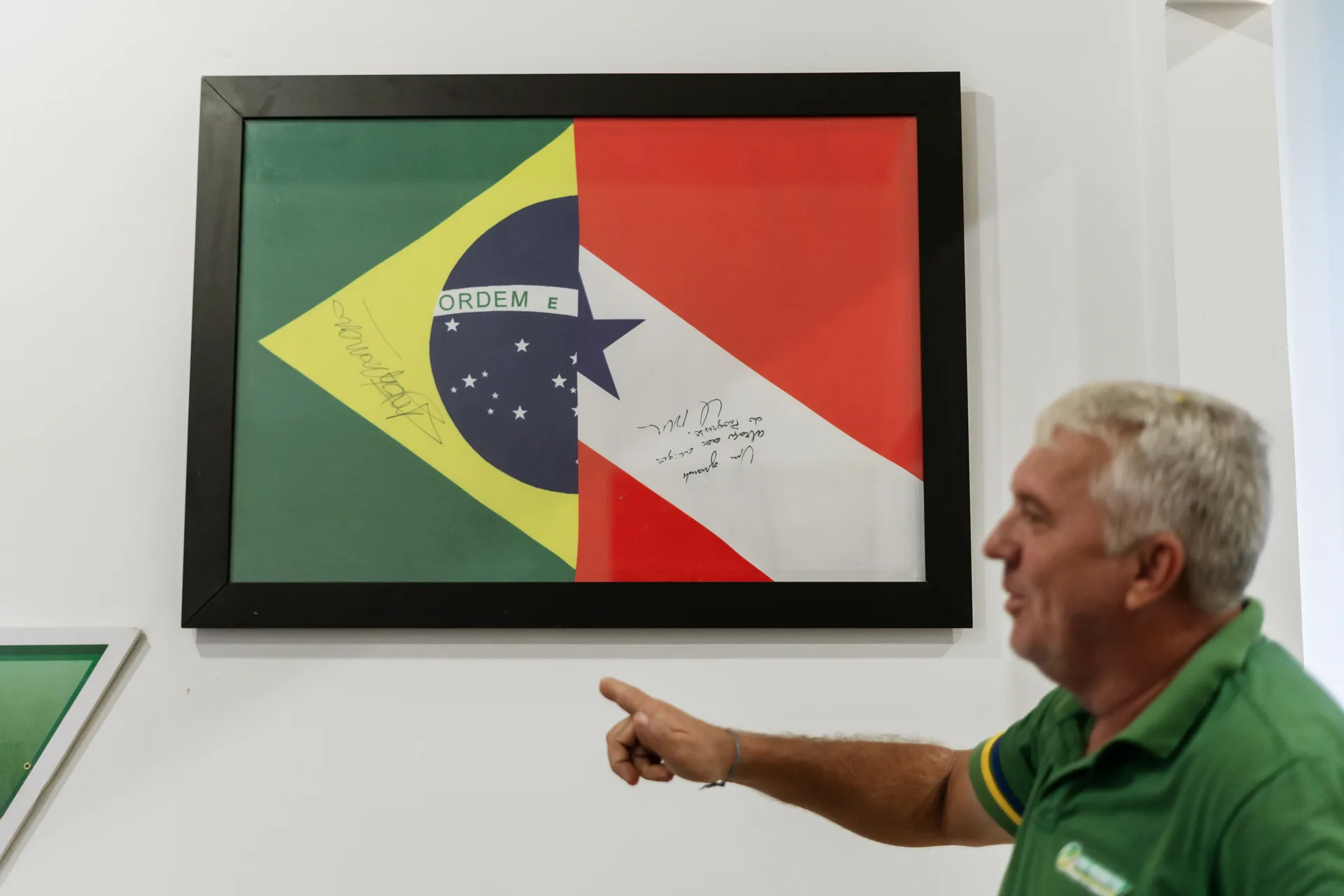
Gelson Dill, reelected in Novo Progresso, displays his political clout with a flag signed by former president Jair Bolsonaro. Photo: Avener Prado/SUMAÚMA
Electoral trends like those of Novo Progresso are repeated in all of the municipalities that are symbolic of the Amazon’s destruction. According to a survey on the ((o))eco website, of the 69 municipalities topping the list of the biggest deforesters and where elections were decided in the first round of voting, left-wing parties were only elected in two. Politicians on the right and far right – for whom environmental conservation is not a priority – also won in Altamira, Itaituba, and São Félix do Xingu, for example. Itaituba is known as the gold laundering capital; São Félix is the city with Brazil’s largest cattle herd, with at least 37 head of cattle for each person; Altamira has one of the highest rates of deforestation in the Legal Amazon.
The 2024 municipal elections were a repeat of the national election in 2022, when the incumbent running for reelection, Jair Bolsonaro, an extreme-right member of the Liberal Party, won big in the municipalities within the Amazon’s so-called Arc of Deforestation. “Bolsonaro won [in 2022] in 265 municipalities (34.7%) that hold 70% of the Amazon forest’s loss in the 36 years prior to the elections,” says a study entitled “Far-Right Political Forces in Brazil Could Lead the Amazon to the Point of No Return,” written by 14 researchers from different universities and research institutes (including the Amazon Environmental Research Institute, the Climate Observatory, and the Kaingáng Institute) and published the week before the first round of voting in 2024. “There was an average loss of 19.9% in native plant area in the [Legal Amazon] municipalities where Bolsonaro won. This is three times more than the average [plant] loss in [Amazon] municipalities won by Lula,” the study compares.
One of the co-authors of the text, Gustavo Canale, a professor and researcher at the Institute of Natural, Human and Social Sciences at the Federal University of Mato Grosso, says: “The extreme right has consolidated where deforestation is historically very high, in municipalities associated with landgrabbing, forced labor, [and] unrestrained agrochemical use.” The predominance of far-right candidates has led to what he calls “political blindness,” where little or no debate is devoted to the climate emergency, even though agribusiness is itself feeling the effects of global heating. “The municipalities in the Arc of Deforestation should be preparing to confront crop losses, for instance, a likely reality in the near future,” the researcher notes, referring to the impact of drought. It is something that political scientist Camila Rocha, a researcher at the Brazilian Center of Analysis and Planning, has also come across when surveying rural producers in the region. “It really caught my attention how they have a very short-term view of [agricultural] production and land use,” she said.
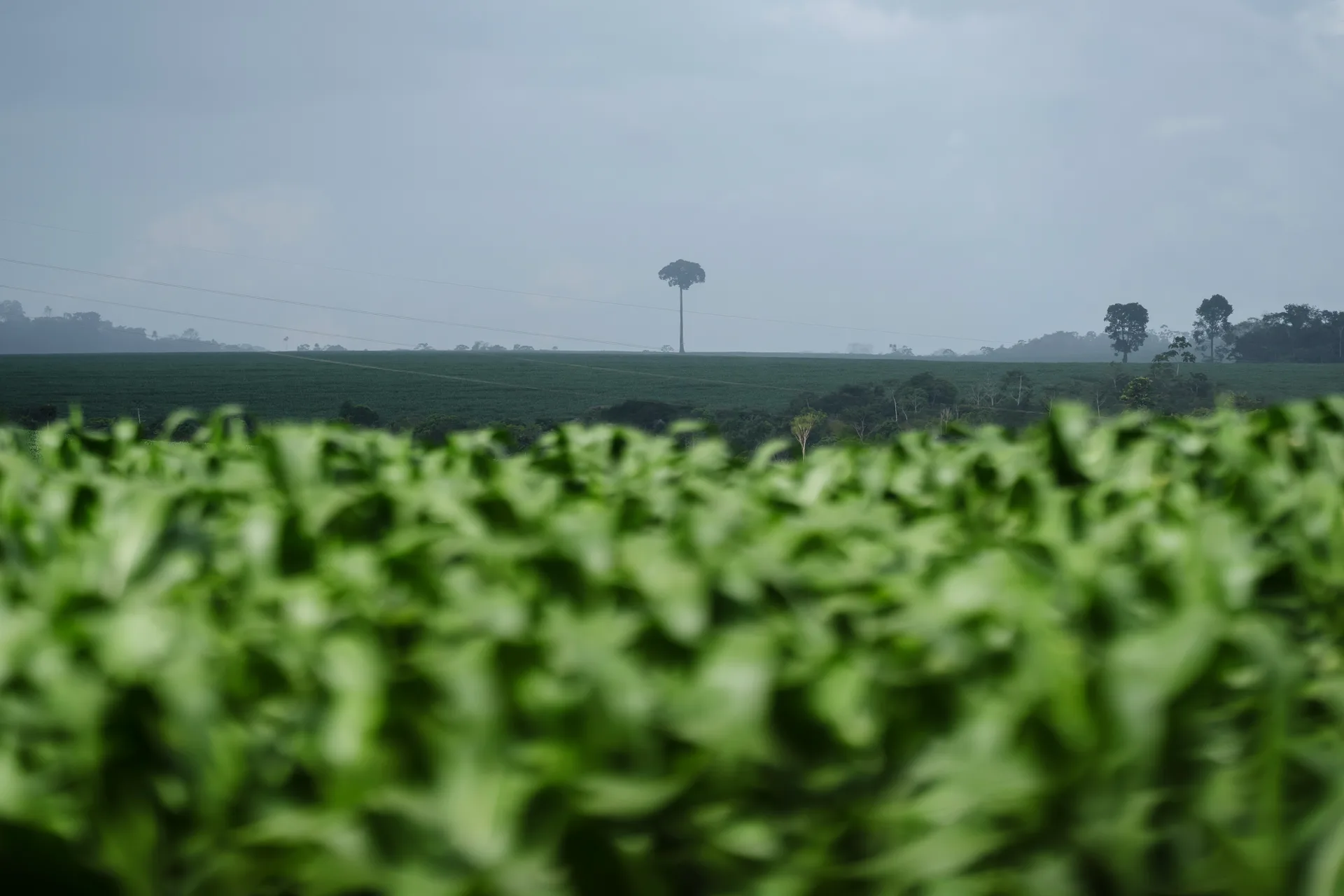
The forest’s destruction by predatory agribusiness has not been stopped during elections, despite surveys showing Amazonians as critical of deforestation. Photo: Avener Prado/SUMAÚMA
Voters reject deforestation, but…
This electoral scenario is even more disturbing in light of other evidence. Most people in the Amazon (58.7%) say that environmental issues – deforestation, fires, drought, flooding and water surges, and extreme heat, in this order – are the region’s main problems. Among those living in Brazil’s North region, 82.2% think that illegal and legal mining operations are negative for the region; 82.7% feel the same about logging. This data was shared in the “Survey of Environmental Values and Attitudes on the Amazon,” a project coordinated by the Federal University of Pará and released in July. “People feel the Amazon’s main problem is environmental. Yet, when I ask whether agribusiness is positive or negative, nearly 70% feel it’s positive,” explains Gustavo Ribeiro, the survey’s coordinator and a professor in the Graduate Studies Program in Political Science at the Federal University of Pará.
When survey data is compared to voting outcomes, the contradictions between discourse and practice are clear. The professor tries to explain these disparities in voter behavior. The politicians gaining strength in electoral disputes in agricultural frontiers, Gustavo Ribeiro points out, depend on the industry’s financial support. That is why predatory agribusiness downgrades environmental issues; they disappear from campaigns and the political agenda. Representatives on the far right have also built “careers” out of successfully making the rounds from municipal councils to local and state executive branches, with agribusiness funding their campaigns. There is also a connection between these political segments’ discourse, chiefly spread on social media by groups on the far-right and right, attacking environmental issues, oftentimes with disinformation.
‘Something changed in the Amazon after Bolsonaro’
Altamira is Brazil’s largest municipality in land area. It has also lost the most forest cover in the Amazon since 2008, according to the Program to Calculate Deforestation in the Amazon. During this time, 6,445 square kilometers of forest were killed off, an area 11 times the size of the city of Chicago. The mayor-elect, Loredan de Andrade Mello, a doctor, is a sort of “moderate Bolsonaro-ist.” He is with the Social Democratic Party, created by Gilberto Kassab in 2011 and whose slogan currently makes a lot of sense to those trying to escape polarization: “Neither right, nor left, nor center.”
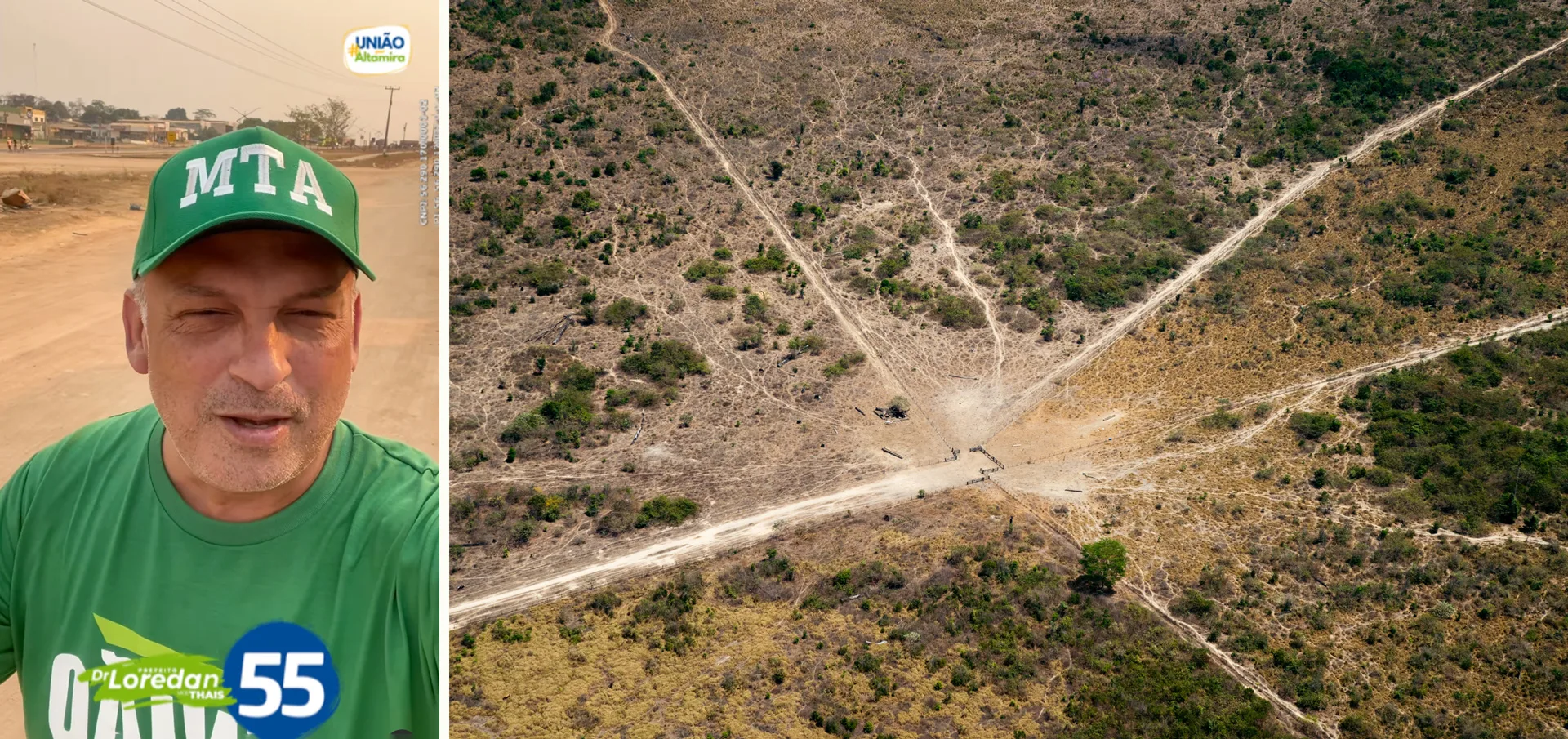
Loredan Mello was elected in Altamira, Pará, where the most forest cover has been lost since 2008. Photos: Screenshot/Instagram and Christian Braga/Greenpeace
Loredan is also a farmer. In Electoral Court filings, he claims to own 100 head of cattle and two rural properties with an estimated joint value of R$ 1.8 million. The Social Democratic Party council member who received the most votes in the city, Chesther Luchetti Pedro, the president of a cooperative of miners who practice a mostly illegal type of mining, is expected to take over as the Municipal Environment Secretary as of 2025.
“Something changed after the Bolsonaro administration,” says social scientist Mauricio Torres, a professor and researcher at the Federal University of Pará. “A significant number of these cities’ residents make their living from stolen timber, cattle raised illegally in conservation units and Indigenous Territories, thefts of public lands, illegal mining. With Bolsonaro, the country’s president began to defend all of this. This defense of what everyone saw as absurd, made openly and without punishment, empowered local elites who make their living from illegal activities,” says Torres, who has studied land conflicts in Pará for years.
This view is shared by Ane Alencar, the science director at the Amazon Environmental Research Institute. “Local elites, who gain resources by exploring land, timber, gold, illegal things, are the ones with money in these municipalities. And they therefore end up electing or supporting elected representatives. Like it or not, these people provide jobs, at illegal timber companies, on barges used for illegal mining,” says Alencar, who is also an author on the paper published in the Campo-Território journal that associates growth in the far right with the Amazon’s destruction.
This is the case in Itaituba, for example, where 12.4 metric tons of gold were mined in 2022 – more than half illegally. There was no shift in power there. Nicodemos Aguiar, with the Brazilian Democratic Movement party, was elected mayor with 48% of the vote. He currently serves as the deputy mayor of the city, led by Valmir Climaco, also with the Brazilian Democratic Movement, who has been convicted of environmental crimes and who owns illegal mining operations. In 2019, police apprehended 580 kilos of cocaine along with heavy weaponry at one of his farms. None of this stopped him from winning two terms and leaving a successor.
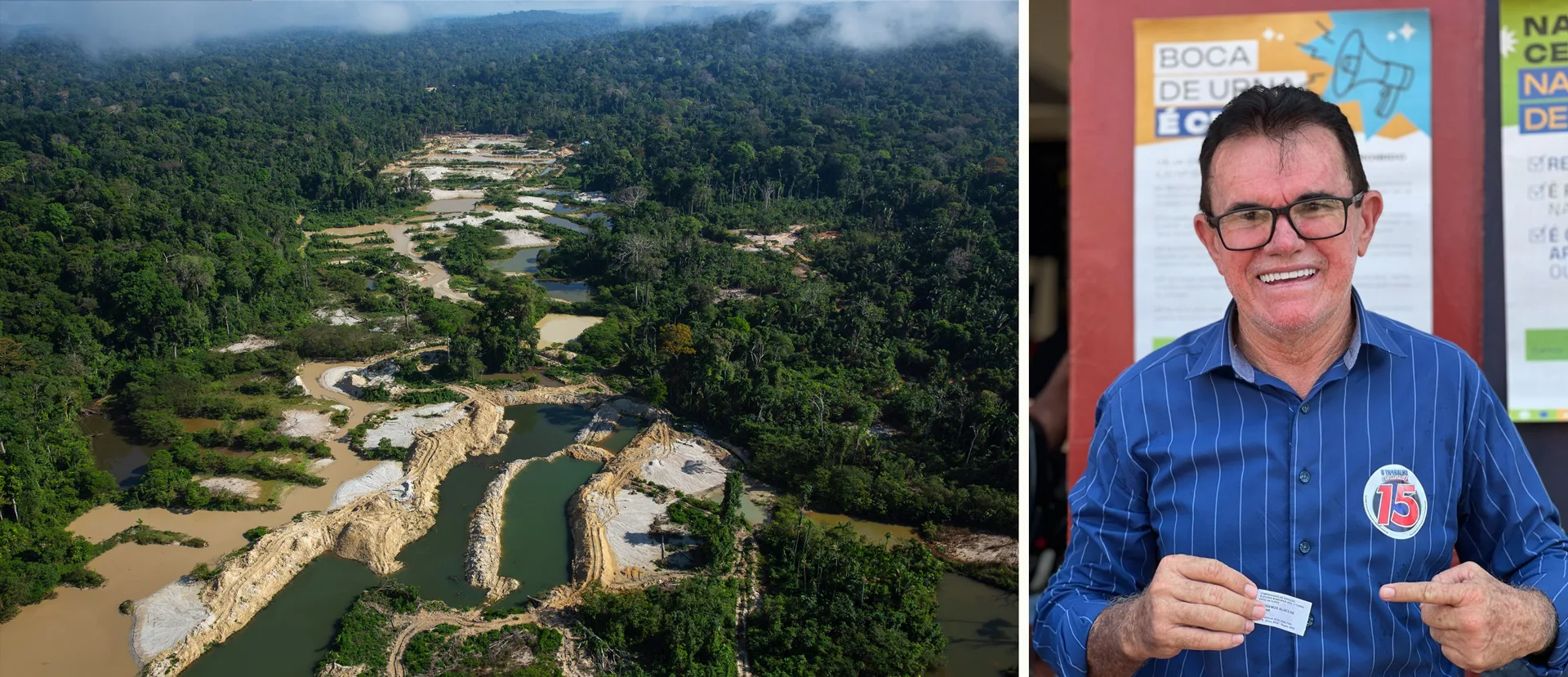
In Itaituba, where more than half the gold is mined illegally, Nicodemos Aguiar, the current deputy mayor, was elected mayor. Photos: Screenshot/Instagram and Lalo de Almeida/Folhapress
While in São Félix do Xingu, where the herd reaches 2.5 million head grazing on what used to be forestlands, mayor-elect Fabricio Batista, with the Podemos party, is a rancher whose surrogate during the election was one of the most notorious Bolsonaro supporters in Pará, Senator Zequinha Marinho, also with the Podemos party. Marinho is a fervent supporter of illegal mining in the Ituna/Itatá and Apyterewa Indigenous Territories; the latter is Brazil’s most deforested Indigenous Territory and was the target of a federal eviction operation in 2023 to remove non-Indigenous people. Three Indigenous candidates ran for the municipal council in São Félix do Xingu, all under the Workers’ Party. None were elected.
Mauricio Torres thinks a lack of effective implementation of agrarian reform programs in the Amazon is feeding the elites who make their living off of environmental crime in the region. “This pushes a lot of people toward a dependent relationship with these criminals, it compels [them] to work in a forced-labor situation to steal timber, or in illegal mining,” he says. “Exploitation ends up being seen as a life alternative. And then this far-right discourse starts to stick, since the rule of law, which complies with the Constitution, is colored as threatening subsistence.”
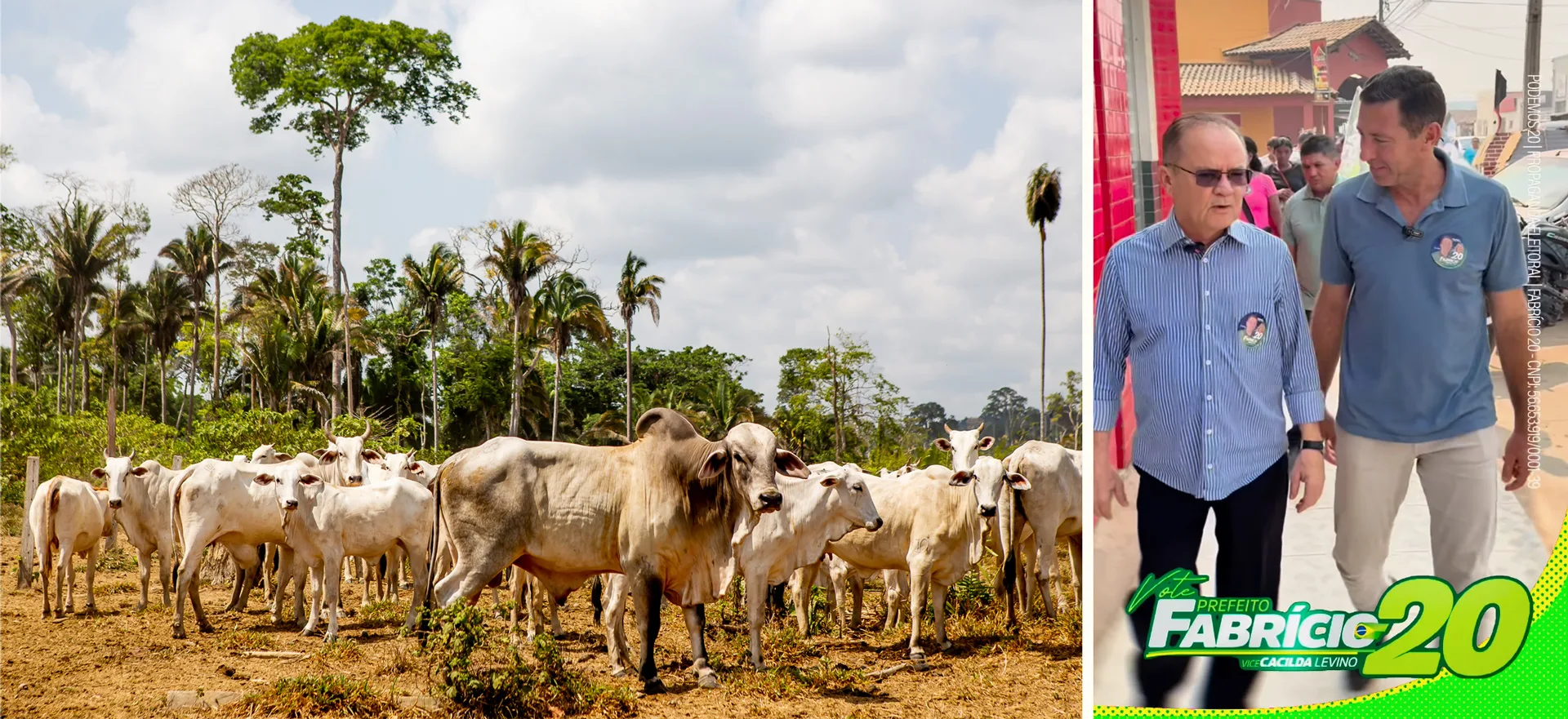
Rancher Fabricio Batista (at right) rose to power in São Félix do Xingu with the support of Senator Zequinha Marinho. Photos: LelaBeltrão/SUMAÚMA and screenshot/Instagram
Four factors behind this phenomenon
Although this agro-predatory elite picked up steam with Jair Bolsonaro’s election in 2018, the gradual advance of the far right needs to be understood as a seed planted long before the presidential contest and caused by multiple factors. Federal University of Amapá political science professor Ivan Henrique de Mattos e Silva has been studying this phenomenon for at least five years. He is also the deputy coordinator of the Legal Amazon Geopolitical Studies Laboratory, which researches political, economic, and social indicators in the nine states that make up the region.
“The rise of these new right-wing groups in the Legal Amazon needs to be grasped on a broader scale,” the researcher says. According to Silva, this phenomenon is a “byproduct of the crisis of the New Republic.” The social pact built during redemocratization, he explains, sat on two contradictory pillars: neoliberal macroeconomics and compensatory policies. If during the first administration of Luiz Inácio Lula da Silva (2003-2006) social prosperity could be guaranteed through an explosion in Chinese demand for agricultural products and raw materials, like ore, imported from Brazil, “then the trade-off came, social conflict grew worse and the pact was broken,” says the professor. He also says that during Lula’s first administration, the government had more abundant economic resources and public policies could be expanded into the social area along with the transfer of income. Nevertheless, after a few years, this formula for economic prosperity was no longer possible, especially with the effects of the global economic crisis, and economic inequality once again grew sharper and more visible in the country. The government’s gradual inability to invest disconnected important electoral segments, like the middle class and even vulnerable sectors, from candidates on the left.
Not only was it a gradual and mounting process, but Ivan Silva says that the extreme-right’s rise can be better understood through four main factors. The first is related to the militarization of the Amazon, especially during the business-military dictatorship (1964-1985). Some states in the region had been federal territories that were managed directly by the federal government, such as Acre, Amapá, Rondônia and Roraima, or they are border areas. The last federal territories were only abolished when the 1988 Constitution took effect. “In the broader Brazilian imagination, and [in the imagination] of the Armed Forces more specifically, it is the scope of the demographic emptiness, where the Amazon needs to be occupied to keep the region from being surrendered to international powers,” he explains, referring to a vision that fails to consider that the forest was inhabited for over 10,000 years by countless Indigenous peoples. “Because there is still great military influence in these regions, this tends to give the political dynamic a more conservative profile,” he explains.
The second factor is the relationship between the Evangelical vote, especially the neocharismatic vote, and voting on the right, which has been extremely strong in Rondônia as well as in Amapá, according to Ivan Silva. The intertwinement of the far right with Evangelical and especially neocharismatic religion is the result of an agenda of conservative morality, such as opposition to abortion or gender issues, for example. Cassiano Luz, the executive director of the Brazilian Evangelical Alliance, helps to shed light on this religious influence. Luz lived in the Amazon for nine years, from the late 1990s to 2007, working on social projects, such as in Yanomami Indigenous Territory. “The Assembly of God is what predominates in the North region, which is far and away the largest Evangelical denomination in Brazil. It has this characteristic of being in the most remote and far-flung places. Generally it gets there first. It’s very strong in the North region, it’s a tremendous force. And this power ends up also being translated into political power,” he explains.

The extreme right’s link to Evangelical conservatism and the military’s ideological vision help to explain the rise of these groups. Photos: Gabriela Portilho/SUMAÚMA and Brazilian Air Force
Another important element to understanding the rise of these extremist politicians is a spike in violent crime in the Amazon. “The dynamic of intensified crime in the North is explained by this overlapping between environmental crimes and violent crimes, at three levels: big capital [agriculture executives, transnationals, etc.], the families with economic power in the region; at the tip are criminals committing everyday and immediate crimes, from deforestation to working as hired guns, landgrabbing, setting fires; and the link between big capital and the tip are the criminal factions,” explains Professor Ivan Silva. In other words, criminal activities in the forest, such as deforestation and illegal mining, are increasingly associated with organized crime in these border areas, and they contribute to practices to launder money from drug trafficking, for instance. This new reality in the Amazon increases local violence. The lack of security favors a very common discourse on the far right, where the “good citizen,” who deserves to be protected, is put on one side, while the “outlaw,” who deserves to be shot in the back, is put on the other,” the researcher says.
Finally, the key aspect to explaining the power this kind of politician holds in the Amazon is, obviously, the changing social profile in the territories, as a result of growth in agribusiness and a conversion to the right. “Rondônia is already, fundamentally, the hub of this agribusiness discourse. In Amapá, there are more and more senators saying the solution for the region is to drill for oil in the Equatorial Margin or bring in soy. All of this is within this rationale of seeing the Amazon as a zone for expanded production,” notes Ivan Silva. “The North region mostly tends to follow this rightward trajectory. Maps of voting in the Legal Amazon from 2010 forward, with the exception of Maranhão and Pará, show more and more votes for the right. It seems to be a trend that is hard to reverse,” he says.
Ivan Silva notes “that the left continues to think the only solution for 2026 is, for now, to put Lula on the ticket again to prevent the return of Bolsonaro-ism and of various facets of Brazilian fascism.” Lula, obviously, has huge electoral capital, slowly-improving economic indicators, and a public machine working for him. However, he may not be the candidate and, up to now, no other strong names have come out of the left to take his place. “That makes the possibility for right-wing votes much higher,” he says.
Bolsonaro is ineligible until 2030, following his conviction by the Supreme Electoral Court for inappropriate use of communication channels in making unfounded accusations about electronic polls. His supporters are trying to grant him amnesty through legislative avenues – that is, in Congress, where most of the traditional, cronyistic right and extreme-right are. In the meantime, there is a fight – behind the scenes, for now – for support and votes from the far-right’s former president, led by São Paulo’s governor, Tarcísio de Freitas, who served in Bolsonaro’s cabinet and is now with the Republicanos, a party connected to the Universal Church of the Kingdom of God.
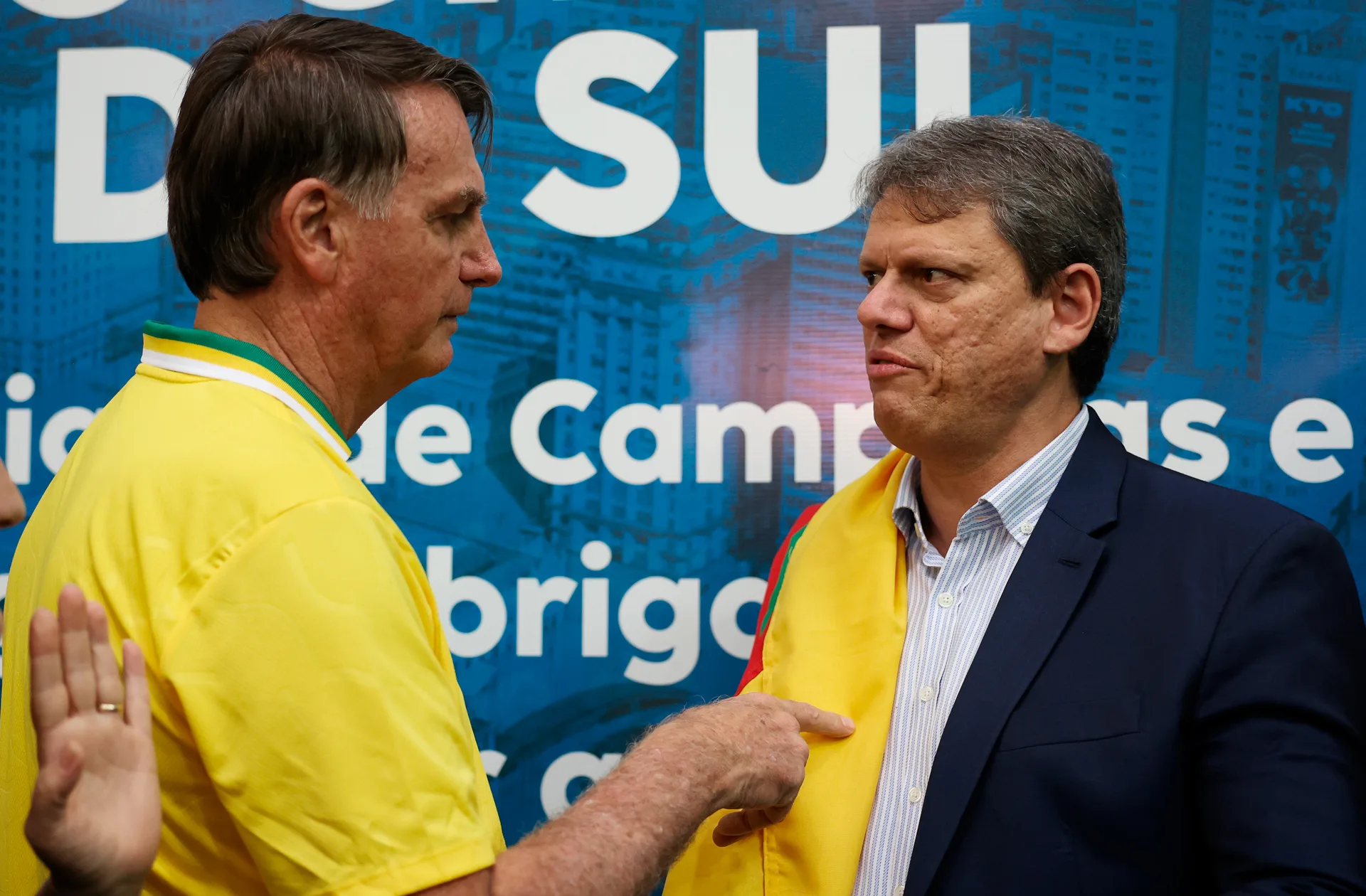
Governor Tarcísio de Freitas is one of the names the right is discussing for the presidency in 2026, as Bolsonaro is barred from running. Photo: Zanone Fraissat/Folhapress
Another right-wing extremist who picked up clout in the municipal dispute was Pablo Marçal, a member of the miniscule Brazilian Labor Renewal Party, who at one point broke with Bolsonaro. In addition, on the right, are the governor of Goiás, Ronaldo Caiado, with the União Brasil party; Romeu Zema, with the Novo party in Minas Gerais; and Ratinho Junior of Pará, a member of the Social Democratic Party and the son of a network TV host. Ratinho senior and junior own large amounts of land in Acre – and a portion of their farms are encroaching on the Kaxinawa Praia do Carapanã and Rio Gregório Indigenous Territories.
The extreme-right’s repeat win in the North region in 2024, associated with agribusiness, is increasing the electoral cache of these political forces for the presidential contest in 2026. “Mayors and municipal council members are the ones taking the lead on the candidate’s campaigns in the presidential elections. But we know that this also depends on the size of the municipalities. Here in Pará, for example, in 2022, the municipalities in the state’s south mostly went for Bolsonaro, and in the north they voted for Lula and the Workers’ Party. Except the north has a bigger population, so overall, Lula won in the state. This data is important for us to assess, because it’s not enough just to have the most mayors and council members, rather they have to govern the most populous cities,” explains political scientist Carlos Augusto Souza, of the Federal University of Pará. Local powers “certainly influence” majority disputes for president and governor, he explains. “Because these local leaders serve as a channel of communication between the general elections and municipal demands. Yet I don’t know if it would be enough to guarantee a far-right win in the 2026 presidential election,” the professor says.
Political scientist Camila Rocha brings up how pork barrel congressional amendments – used to finance municipal projects for upper and lower house members’ voting bases – weighed on results from 2024, and the impact they will have two years from now. “What are referred to as the ‘Big Center’ parties, chiefly the Brazilian Democratic Movement, Social Democratic Party, Progressives Party and União Brasil party, performed very well in the Amazon region. Members of Brazil’s lower house of congress who benefit from mayoral election results are likely not only to get reelected, but also to elect more candidates aligned with interests like agribusiness, which are harmful to the environment. It isn’t a positive outlook for the environment, from the standpoint of the next congressional election, or the presidential election, since these politicians will probably support the Bolsonaro-backed candidate.”
New paths and new ways of walking
Although the electoral contests in 2024 have consolidated the far right’s growing power, new paths are being bolstered to fight for space with the forces of predatory agribusiness and the economic model pushing the Amazon to destruction. In light of the climate emergency, Indigenous, Quilombola and smallholder social movements have realized the urgency to compete for spots in municipal councils, statehouses, and the national congress. And they are increasingly organized, despite taking slow strides.
Indigenous candidates, for instance, received over 1.6 million votes from Brazilian electors on October 6. In addition to recruiting more candidates, and in a way that is much more organized and unified around the country, the Indigenous movement has elected more representatives. Out of the 2,508 candidates connected to the Indigenous Campaign, an initiative of the Alliance of Indigenous Peoples of Brazil, with representatives from 169 peoples, 256 candidates were elected: 198 male and 36 female council members, eight male and one female mayors, and nine male and four female deputy mayors. In 2020, 236 Indigenous candidates were elected.
“We don’t agree to oil, or exploration and mining in Indigenous territories. We have a very firm position on issues that Indigenous leaders want for the Amazon. These are our issues: demarcation of lands and no exploration of anything within Indigenous Territories,” says Alana Manchineri, a communications manager with the Coordination of Indigenous Organizations of the Brazilian Amazon), which is connected to the national articulation of Indigenous peoples. Indigenous candidates had to make a commitment with a manifesto where they promise, for instance, to stand against the “Marco temporal” historic cut-off point for indigenous land demarcation.
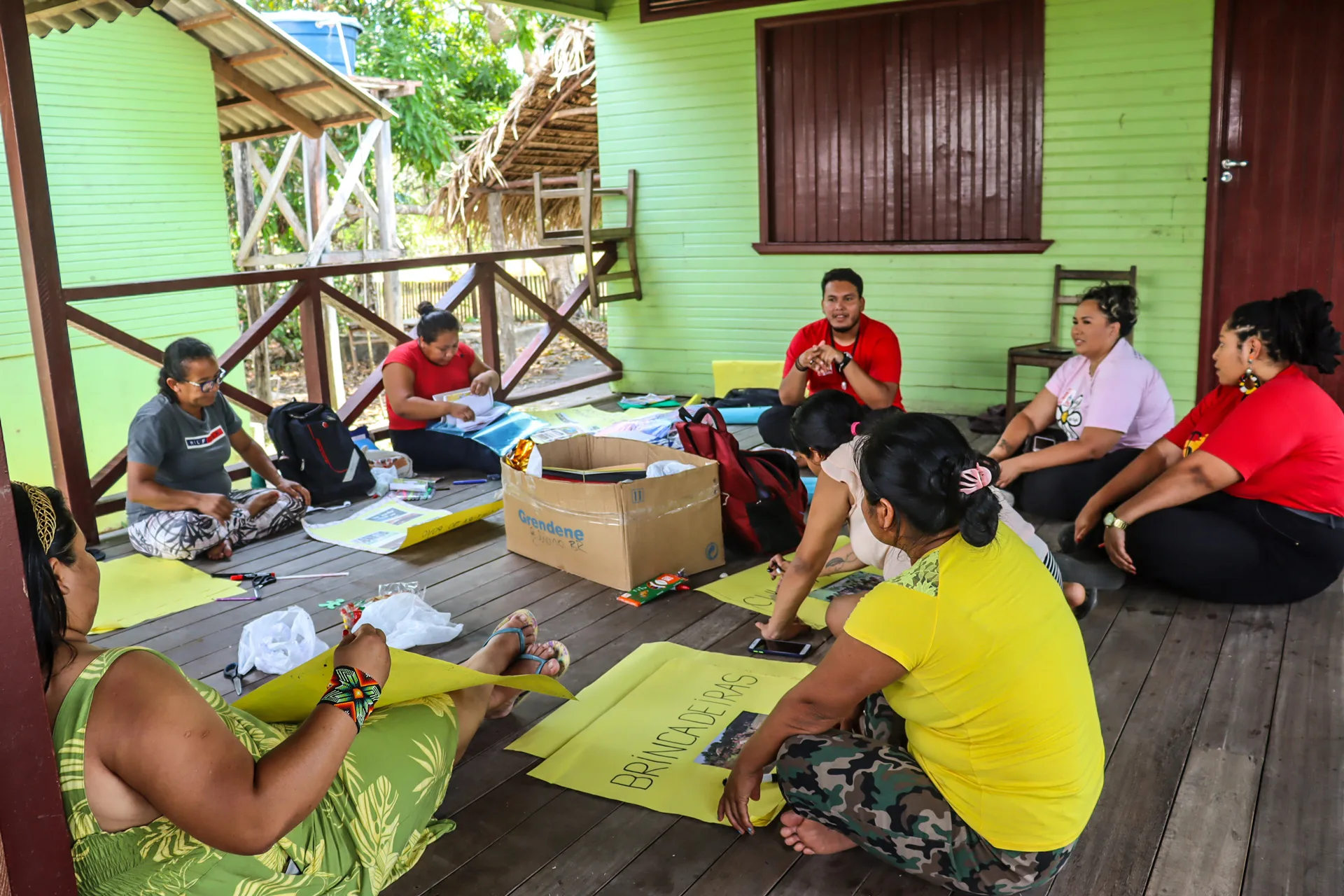
Alana Manchineri (in the light pink shirt) talks with Indigenous candidates to make their commitment to life and the territories clear. Photo: Kauri Waiãpi/Coiab
A member of the Manchineri Indigenous peoples of Acre, Alana has closely followed the campaign. She says that with the growth in the extreme right, the movement has found Indigenous rights have begun to be ignored in municipal councils and at statehouses. “More than ever, especially after the passage of Law no. 14.701 (the historical cut-off point), we’ve realized how very important it is for us to be in the Legislative [branch],” Alana says. She recognizes that the contest is still very unequal, especially based on the political and economic power of the candidates connected to agribusiness and the extreme right. “This deception that [mining, oil exploration, and other predatory economic activities] will bring wealth and everything else, is very strong. Our agenda is economic alternatives, a stronger Indigenous economy,” she explains.
The Indigenous campaign has been synching with the Black, Quilombola and Landless Rural Workers’ movements, Alana says. “We are in a process of organizing along with the other social movements who are enduring the same fights as us: land and territory. It’s what unites us,” she says.
Pablo Neri, a member of the national board for the Landless Rural Workers’ Movement, representing Pará, says the movement has created regional groups to work in a network on communications, legal, and accounting matters for all of its candidates. “Popular agrarian reform is only achieved by changing laws,” says Neri. “Candidates from our base are always competing in elections. What’s new this year was the organic nature of the movement, the national dimension for electoral work,” explains Neri, who coordinated the landless rural workers’ electoral working group in Pará.
The unprecedented electoral articulation by the Landless Rural Workers’ Movement paid off: 133 candidates were elected, including council members and mayors, in 19 states. It may seem paltry in relation to the territorial size of Brazil, but it is symbolic. “We had a win in Parauapebas, here in Pará, where we have over 13,000 families camped in the Carajás region, which reflects a growing severity in [agrarian] conflicts,” says the Landless Rural Workers’ Movement coordinator. The results were motivating for the Landless Rural Workers’ Movement, he says, but no one is under any illusions. The movement elected a single council member in the municipality, where Aurélio Goiano, with the right-wing Avante party, won the mayorship with nearly 60% of valid votes. “It was a far-right victory, it was confirmation that Bolsonaro’s successive visits to southern and southeastern Pará were not in vain. Yet we came out victorious in this sense, of having gotten people on the street, of having an open debate, of having been a force that counteracted this movement of expanding the right and the domination of Barbalho-ism [referring to the Barbalho family] in Pará,” he concludes.
There was not one single day of campaigning on the street, says Pablo Neri, when smoke, the scorching sun, and dust weren’t there. “How can you go about provoking this break with common sense that is agribusiness and the literacy the right builds, of easy money, and it builds other requirements for a good life, quality of life, collective action in the world?” the social movement representative asks. Practices like agroecology, for example, can be massified and become public policy, he proposes. All of this, he says, will only be possible with a new “Amazonian smallholder unit, of the landless, the Indigenous, the Quilombolas,” which would be crucial to get through these times.
Pablo Neri cites an Amazonian poet, giving meaning to hope and not giving up on the electoral articulations of the biggest victims of life’s destruction. “Thiago de Mello once said: It’s not that I have a new path, the new thing I have is how I walk.” The path of resistance remains the same, he explains, but it is necessary to find new ways of showing voters how this extractivist model of agribusiness means a deterioration of living conditions, accelerating the climate emergency, generating permanent discomfort, insecure human and more-than-human life, increased anxiety and collective illness. Neri recalls how philosopher and educator Paulo Freire – who, not by chance, is hated by the far right – said that in Brazil, having hope is a revolutionary act. Those defending the forest know why.
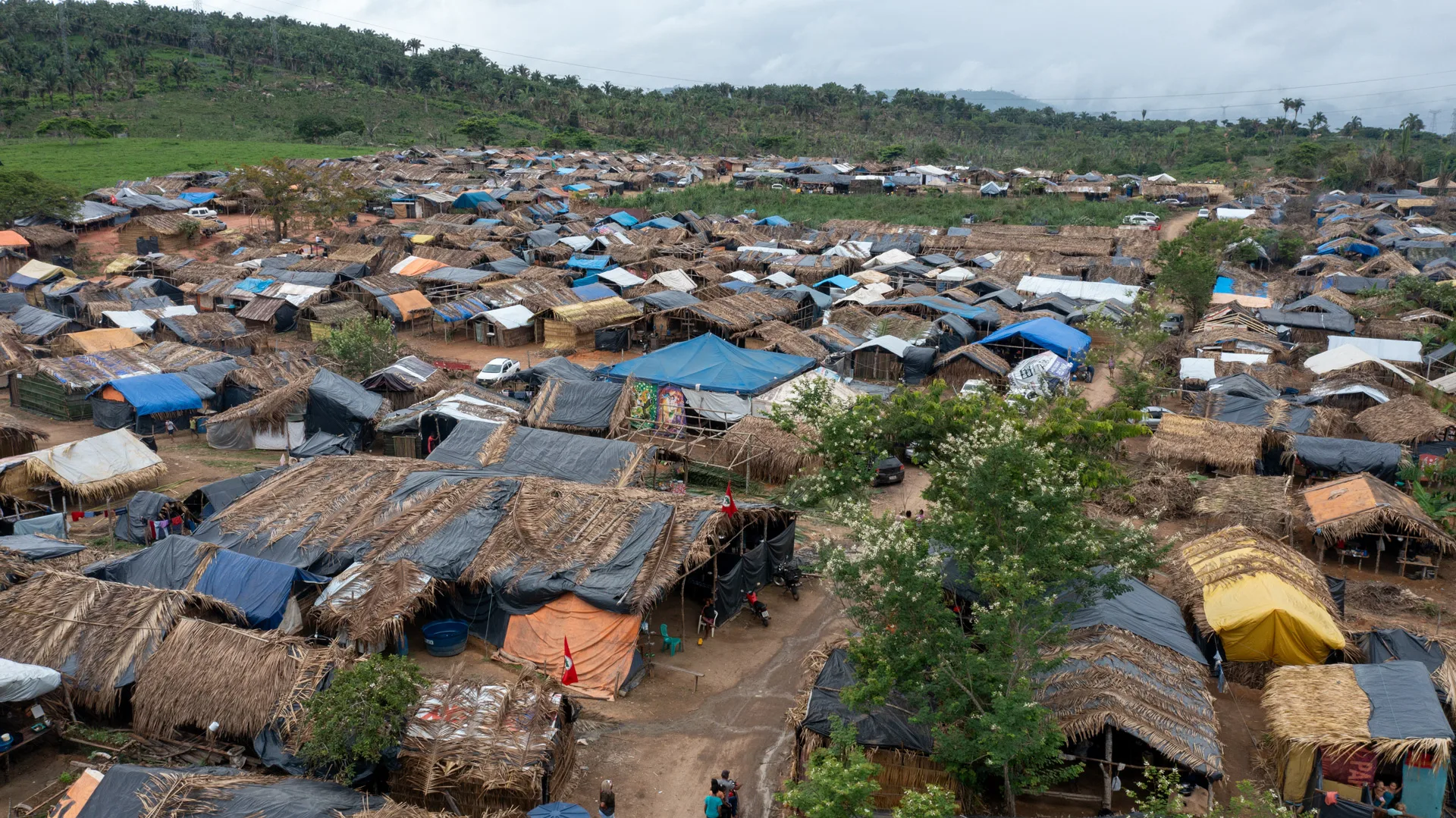
Parauapebas, Pará, where the Landless Rural Workers’ Movement has a camp and is fighting against mining, elected a council member from the movement. Photo: João Laet/SUMAÚMA
Report and text: Malu Delgado and Rafael Moro Martins
Editing: Talita Bedinelli
Photo Editor: Lela Beltrão
Fact-checker: Gustavo Queiroz and Plínio Lopes
Proofreader (Portuguese): Valquíria Della Pozza
English translation: Sarah J. Johnson
Spanish translation: Julieta Sueldo Boedo
Editorial workflow coordination: Viviane Zandonadi
Editor-in-chief: Talita Bedinelli
Editorial director: Eliane Brum





